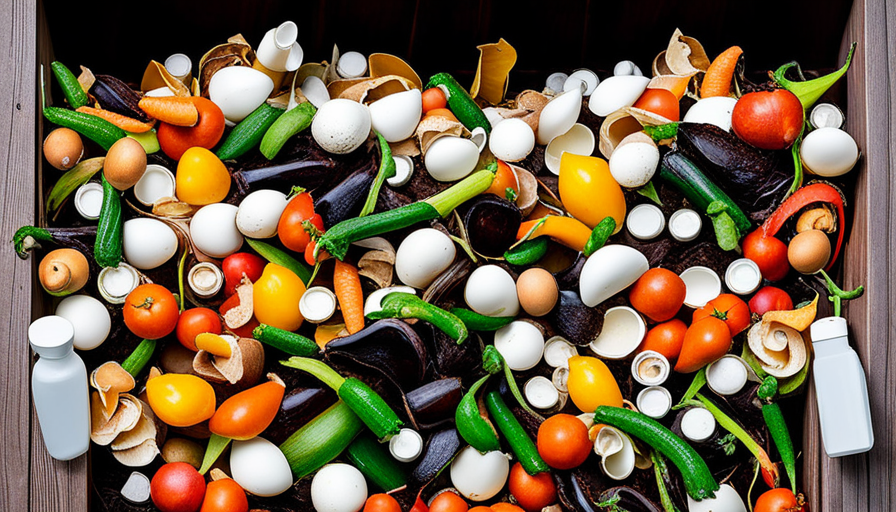Are you trying to reduce your carbon footprint and live a more sustainable lifestyle? One way to do this is by composting. But what about those bottles of vinegar sitting in your pantry? Can they be composted too?
As the saying goes, ‘when life gives you lemons, make lemonade.’ Similarly, when life gives you vinegar, use it for composting! Vinegar can actually be a useful addition to your compost pile as it helps break down organic matter and neutralize odors. However, there are some things you should know before adding vinegar to your compost bin.
Let’s dive into the basics of composting and explore the benefits of using vinegar in your pile.
Key Takeaways
- Adding vinegar to a compost pile can accelerate decomposition and repel pests.
- Vinegar can act as an organic fertilizer and balance pH levels in the compost pile.
- The recommended ratio of vinegar to water for composting is 1 part vinegar to 4 parts water.
- Consistency is key in composting, and a well-balanced compost pile can be achieved by combining kitchen scraps and yard waste with diluted vinegar.
Understanding Composting Basics
Composting is a simple and effective way to turn organic waste into nutrient-rich soil, and understanding the basics is key to successfully composting at home.
There are several composting methods you can choose from, but all of them involve breaking down organic matter into smaller pieces that eventually turn into rich soil. The most common methods include backyard composting, vermicomposting (using worms), and bokashi composting (using a fermentation process).
Aside from being an easy way to reduce waste, composting also has a positive environmental impact. By diverting food scraps and yard waste from landfills, you help reduce methane emissions which are harmful greenhouse gases.
Additionally, using homemade compost instead of synthetic fertilizers helps promote healthy soil ecosystems by providing essential nutrients to plants without contributing to water pollution or other negative environmental effects.
Overall, learning the basics of composting isn’t only beneficial for your garden but also for the planet.
What Can and Cannot be Composted
To effectively nourish your compost, it’s important to be aware of what materials are suitable and unsuitable for decomposition. While composting may seem simple enough, there are certain items that shouldn’t be added to your compost bin.
Meat and dairy products, for example, can attract pests and rodents and can also produce unpleasant odors as they decompose. On the other hand, there are several items that can greatly benefit your compost when added in moderation.
Fruit and vegetable scraps are excellent sources of nitrogen, while eggshells provide calcium which helps balance the pH levels of your compost pile. Additionally, paper products such as newspaper or cardboard can also be used as a carbon source to help create a healthy balance between nitrogen-rich green materials and carbon-rich brown materials.
By being mindful of what you add to your compost bin, you can create a nutrient-rich soil amendment that’ll benefit both your garden and the environment.
Benefits of Composting with Vinegar
Adding a splash of vinegar to your compost can work wonders in transforming your scraps into nutrient-rich soil. Vinegar acts as an organic fertilizer that accelerates the decomposition process, making it easier for microorganisms to break down the organic matter. This results in faster composting and healthier soil.
Composting with vinegar is also a great way to keep pests and insects at bay. The acidity of vinegar repels ants, flies, and other unwanted visitors that may disrupt the composting process.
Additionally, using vinegar as an organic fertilizer helps balance the pH levels in the soil, which is essential for healthy plant growth. So next time you’re tending to your compost pile, remember to add a splash of vinegar for an extra boost!
Tips for Composting with Vinegar
Incorporating vinegar into your composting routine can enhance the nutrient content of your soil and deter unwanted pests. However, it’s important to remember that too much vinegar can harm plants. Aim for a ratio of 1 part vinegar to 4 parts water when adding it to your compost pile.
Another tip for composting with vinegar is to use it in conjunction with other organic materials. Add kitchen scraps and yard waste along with the diluted vinegar mixture to create a well-balanced compost pile. This will not only improve the overall health of your garden, but also reduce waste and benefit the environment.
Remember, consistency is key when composting. Stick to a regular schedule and observe how your plants respond to the added nutrients from vinegar.
Frequently Asked Questions
What types of vinegar are suitable for composting?
Transform your compost with leftover vinegar! Any type works wonders for improving soil quality. The acidic properties break down organic matter faster, producing nutrient-rich humus. Don’t let that extra vinegar go to waste – give it to your garden instead!
Can I use vinegar to speed up the composting process?
To speed up the composting process, mix green and brown materials with water and oxygen. Composting benefits include reducing waste and improving soil quality. Vinegar alternatives for composting include coffee grounds and eggshells.
Will adding vinegar to my compost affect the pH levels?
Adding vinegar to your compost may lower the pH levels, which could negatively impact soil health. Consider alternative composting methods such as adding lime or using a balanced mix of green and brown materials to maintain optimal pH levels in your compost.
Is it safe to compost vinegar with other organic materials?
Boost your composting benefits by avoiding vinegar. Instead, try alternatives like citrus fruit or coffee grounds. Composting with vinegar may harm beneficial microbes and create a sour smell in your pile.
Can I use vinegar as a natural weed killer in my compost?
Using vinegar as a pesticide in your compost may harm beneficial microbes. Consider alternatives such as hand weeding, mulching or using corn gluten meal. Composting vinegar is safe but not recommended for weed control.

